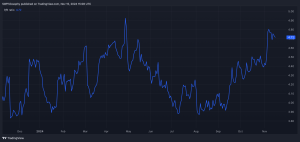Like a lot of life, the stock market contains the good, the bad, and the ugly. While I spend time looking for great shares to buy for my portfolio, I also come across some that I do not want to own.
That could be because I do not like the business prospects, the share price – or both. After all, at the wrong price, even a great business can make a terrible investment.
With that in mind, here are three shares I would not touch with a bargepole at the moment.
Ocado
Let’s start with a case of where I do not like the business or the price: Ocado (LSE: OCDO).
Ocado Is two businesses in one. The first is an online grocery retail operation in the UK. That can make money, as it has proven. But retail is a brutally competitive low-margin industry. Ocado faces competition from a host of businesses, such as Tesco and Amazon, meaning profit margins will likely never be spectacular.
The second business is selling digital commerce technology and fulfilment solutions to other retailers, such as Morrisons here and Kroger across the pond.
That could be a good business. Ocado has an impressive customer base and proprietary technology. But the business model is capital-intensive and Ocado has yet to prove that it can be profitable on a sustained basis.
Despite that, Ocado – which this week reported a loss before tax of £154m for the first half – has a market capitalisation close to £3bn. I regard the total business as still unproven when it comes to profitability – and reckon the valuation is too high.
National Grid
Another firm with heavy (in fact, much heavier) capital expenditure requirements is National Grid (LSE: NG).
Unlike Ocado, it has proved it can be consistently profitable, reporting £2.3bn in earnings last year. That helps fund a dividend that has grown regularly and the shares now offer a dividend yield north of 6%. For many income-focused private investors, that makes National Grid a stock market darling.
The problem, as I see it, is the vast expense involved in maintaining (let alone reshaping) a national energy distribution network. That led the FTSE 100 business to dilute existing shareholders this year to raise cash.
Yet its net debt remains stubbornly high. With that balance sheet, ongoing capex demands and regulatory caps on pricing, I do not like the business model, even though National Grid is a monopoly in some areas.
Spirax
Now for Spirax (LSE: SPX), a company whose business model I think is superb — but whose stock market valuation knocks it out of contention for my ISA right now.
The company is also in the FTSE 100, reflecting years of growth. Its focus on safety-related items means clients are willing to spend for quality, even when budgets are under pressure.
It has built a strongly profitable business in part through a long string of acquisitions. That has enabled it to increase its dividend per share annually for decades, although I do see a risk of potentially overpaying for future acquisitions hurting profitability.
The shares have fallen 18% in a year and now stand just 0.3% higher than they did five years ago. Yet, at a price-to-earnings ratio of 35, I still see them as overvalued.
This post was originally published on Motley Fool







